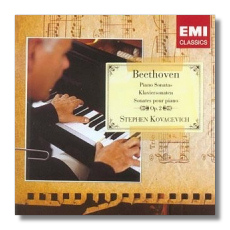
The Internet's Premier Classical Music Source
Related Links
- Beethoven Reviews
- Latest Reviews
- More Reviews
-
By Composer
-
Collections
DVD & Blu-ray
Books
Concert Reviews
Articles/Interviews
Software
Audio
Search Amazon
Recommended Links
Site News
 CD Review
CD Review
Ludwig van Beethoven

Piano Sonatas
- Piano Sonata #1 in F minor, Op. 2 #1
- Piano Sonata #2 in A Major, Op. 2 #2
- Piano Sonata #3 in C Major, Op. 2 #3
Stephen Kovacevich, piano
EMI Classics 7243 557730-2 DDD 61:36
"In my end is my beginning," as they say. Stephen Kovacevich is reaching the completion of his Beethoven piano sonata cycle for EMI Classics. Having scaled the Everests of the "Hammerklavier" and "Appassionata" Sonatas, Kovacevich is winding the cycle down with the very first works that Beethoven wrote in this genre. The recording dates were June 2002 (#3) and January 2003 (Nos. 1 and 2).
Kovacevich is intent on keeping a wide gulf between Beethoven and Haydn or Mozart. Those older composers often are mentioned as influences on the young composer, and these sonatas can be validly played almost as if they were late works by Haydn. The pianist's clipped articulation does suggest a fortepiano more than a modern concert grand, but interpretively, Kovacevich presents Beethoven as a nose-thumber out to turn things on their ears. He published these three sonatas when he was in his mid twenties, and when he was still a fairly new face in Vienna. These sonatas contain difficulties that are within the reach of some amateurs, and others that are tantalizingly elusive. This music is full of the cockiness and irreverence of youth. Listen, for example, to the finale of the Piano Sonata #3. The first theme, a lickety-split series of parallel chords hopping up the keyboard, sounds like the giddy mockery of an older person's pomposity. Near the end of the movement, Beethoven wanders into another key as if to prolong the discussion, but then he pulls back into the original key and brings the movement to a swift close. The modern phrase that this procedure evokes is "Don't go there!"
Kovacevich has been with us for several decades. (He used to play under the name Stephen Bishop, and then as Stephen Bishop Kovacevich.) Even so, he plays these works with a young adult's love for raucous humor, and with the occasional exaggeration or "tall tale." Even when he is using the pedal generously, Kovacevich keeps the notes dry and almost detached with his strong and highly assertive attack. His tempos are fast - not even the slow movements allow much time for reflection. His technique remains unassailable. It is good to hear a seasoned virtuoso "play," in both senses of the word!
Some of the engineering in Kovacevich's Beethoven series has been a little clangorous, but things are OK on this disc. The sound is dry but full. The microphones also pick up a few vocalizations from the pianist himself.
Copyright © 2004, Raymond Tuttle


















